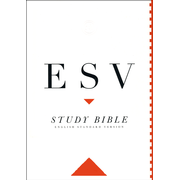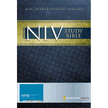Well, I'm partway into Psalms now, and I'm learning something I didn't know before! The Psalms are of course individual compositions (with a couple of exceptions where one finished work seems inexplicably to have been divided into two psalms), but the book is actually in some spots pretty tightly organized by theme. I mean, anyone who's read through the Psalms knows that there are sections called "Book One" and "Book Two" and so on, five in all, but even within those sections, things are often tightly organized.
Let's take the part I just finished reading: Psalm 15 through Psalm 24. These psalms are arranged in a mirror-image format, with a kind of "hinge" at Psalm 19. Let me show you what I mean. Take a look at Psalm 15:
O LORD, who shall sojourn in your tent?Now take a look at verses 3-6 of Psalm 24:
Who shall dwell on your holy hill?
He who walks blamelessly and does what is right
and speaks truth in his heart;
who does not slander with his tongue
and does no evil to his neighbor,
nor takes up a reproach against his friend;
in whose eyes a vile person is despised,
but who honors those who fear the LORD;
who swears to his own hurt and does not change;
who does not put out his money at interest
and does not take a bribe against the innocent.
He who does these things shall never be moved.
Who shall ascend the hill of the LORD?Obviously, there's some synergy going on there! The two psalms are related. After I read Psalm 15 and the excerpt from Psalm 24, I went on to the lovely Psalm 16 (here's an excerpt):
And who shall stand in his holy place?
He who has clean hands and a pure heart,
who does not lift up his soul to what is false
and does not swear deceitfully.
He will receive blessing from the LORD
and righteousness from the God of his salvation.
Such is the generation of those who seek him,
who seek the face of the God of Jacob. Selah
The LORD is my chosen portion and my cup;I read that and thought, "What a beautiful, peaceful psalm! I wonder what it matches up to?" then I realized that its partner is the beautiful, peaceful, and much more famous Psalm 23!
you hold my lot.
The lines have fallen for me in pleasant places;
indeed, I have a beautiful inheritance.
I bless the LORD who gives me counsel;
in the night also my heart instructs me.
I have set the LORD always before me;
because he is at my right hand, I shall not be shaken.
(Psalm 16:5-8)
The next partner, I realized, was Psalm 22, the psalm that begins with "My God, My God, why have you forsaken me?" and ends with the idea (but not the actual phrase) "It is finished." In the middle it describes the suffering of one anointed by God, begging for God's help to escape his enemies. The writers of the New Testament, particularly Matthew, used this Psalm in telling the story of Christ on the cross. I wondered how Psalm 17 was going to match up. See what you think in this excerpt:
Keep me as the apple of your eye;Psalm 18 is a slightly modified version of 2 Samuel 22, where David is praising God for saving David from his enemies. Its counterpoint is actually two psalms: Psalm 20, a prayer by the people that God would give success in battle to their king, and Psalm 21, a psalm of praise from the king to God for the answer to the prayer of the previous psalm. It's easy to see that the themes, if not the exact content, of the three psalms are related.
hide me in the shadow of your wings,
from the wicked who do me violence,
my deadly enemies who surround me.
They close their hearts to pity;
with their mouths they speak arrogantly.
They have now surrounded our steps;
they set their eyes to cast us to the ground.
He is like a lion eager to tear,
as a young lion lurking in ambush.
Arise, O LORD! Confront him, subdue him!
Deliver my soul from the wicked by your sword,
from men by your hand, O LORD,
from men of the world whose portion is in this life.
You fill their womb with treasure;
they are satisfied with children,
and they leave their abundance to their infants.
(Psalm 17:8-14 ESV)
Psalm 19 is the hinge between the halves of the mirror-image; it ties things together quite nicely. It particularly evokes the "Who?" and the focus on holiness from Psalms 15 and 24, but it also touches on nature themes like the ones in Psalms 23 and 24. The most prominent part of Psalm 19, verses 7-11, is a hymn to the perfection of the teachings given to humanity by God.
Maybe some people spot these kinds of connections between parts of the Psalms without any help. Certainly, someone was the first person to spot them. But great study materials do a terrific job of helping you see things you might not spot yourself without them. I've really been enjoying both of the study Bibles I've been reading, but for connections like this in Psalms, the NIV Study Bible has the ESV Study Bible beat hands down (the ESV Study Bible has its own strengths, though; it particularly seems to do a good job of directing you through the Scriptures like a tour guide, while the NIV Study Bible sometimes focuses on arcane details to the point of losing the forest in the trees). I would highly recommend either (or both!) of those study helps. Click one of the links at the head of this article and order one for yourself, or buy them from a Bible bookstore near you (I bought my ESV Study Bible locally, and bought my NIV Study Bible from ChristianBook.com). But even if you don't have a study Bible, get some Bible and spend quality time in God's Word. It is the most rewarding, valuable thing you will ever do.






No comments:
Post a Comment